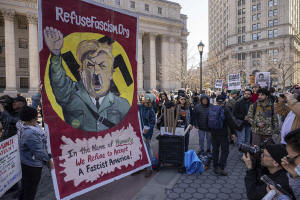Trump campaigned as a protector of free speech. Critics say his actions
as president threaten it
[March 13, 2025]
By NICHOLAS RICCARDI and CHRISTINE FERNANDO
DENVER (AP) — When President Donald Trump gave his joint address to
Congress last week, he boasted that in his first few weeks back in the
White House he had “brought free speech back to America.”
But First Amendment advocates say they've never seen freedom of speech
under attack the way it has been in Trump's second term.
Trump's Republican administration has threatened Democratic members of
Congress with investigation for criticizing conservatives, pulled
federal grants that include language it opposes, sanctioned law firms
that represent Trump's political opponents and arrested the organizer of
student protests that Trump criticized as “anti-Semitic, anti-American.”
“Your right to say something depends on what the administration thinks
of it, which is no free speech at all,” said Will Creeley, legal
director of the Foundation for Individual Rights and Expression, a
nonpartisan First Amendment group.
Trump on Monday took credit for the arrest by immigration agents of
Mahmoud Khalil, a Columbia University graduate student and legal
permanent resident who helped lead pro-Palestinian protests there.
Khalil's lawyers say the government is targeting him for his activism
and to “discriminate against particular viewpoints.”
Secretary of State Marco Rubio said Wednesday that the administration
will revoke the visas or green cards of supporters of Hamas, which the
U.S. has designated a terrorist organization and denied that the policy
threatened the First Amendment.
“This is not about free speech," Rubio told reporters in Shannon,
Ireland. "This is about people that don’t have a right to be in the
United States to begin with. No one has a right to a student visa. No
one has a right to a green card.”

A federal judge earlier this week ordered immigration officials not to
remove Khalil from the country while his case is sorted out.
“This is the first arrest of many to come. We know there are more
students at Columbia and other Universities across the Country who have
engaged in pro-terrorist, anti-Semitic, anti-American activity, and the
Trump Administration will not tolerate it,” Trump wrote.
Targeting universities over language and demonstrations
Even some Trump allies were uncomfortable with that approach: “There's
almost no one I don't want to deport,” wrote conservative commentator
Ann Coulter on X, “but, unless they've committed a crime, isn't this a
violation of the first amendment?”
On the other end of the political spectrum, activists who organized to
protest the war in Gaza were aghast at the administration's move.
“We learn about our First Amendment rights since we’re children,” said
Germán Rafael González, a member of Stanford University's Students for
Justice in Palestine. “But that is very much a myth. It’s not the
reality we live in right now. And it’s scary.”
Prior to the arrest of Khalil over the weekend, the administration
pressured Columbia University to crack down on anti-Israel activism
among students and faculty, and Trump has threatened to go after any
college that supports protests he deems “illegal.”
He also issued an order forbidding federal funding of what his
administration labels diversity, equity and inclusion, which led to a
freeze on federal grants as the administration reviews them for
forbidden words such as “gender.”
Todd Wolfson, president of the American Association of University
Professors, which sued the Trump administration over its DEI ban and won
an injunction against it from a federal judge, said the administration
is pulling funding from projects that have prohibited words, yanking
grants from research into such areas as crop diversity or differences in
infant mortality in urban and rural areas.
“Nobody really wants Big Brother telling you what you can research,”
Wolfson said. “These are questions our country needs to know the answers
to.”
‘The most serious of threats’ to free speech
Republicans for several years have been the party complaining about
infringements on the First Amendment, from complaints about “woke”
colleges canceling conservative speakers to bashing social media
companies they accuse of censoring conservative viewpoints, including
cutting Trump off after the Jan. 6, 2021, attack by his supporters on
the U.S. Capitol. GOP-controlled Florida and Texas even drew up laws to
limit how social media firms regulate content, though the U.S. Supreme
Court kept them on hold last year because of possible First Amendment
violations.
[to top of second column]
|

Demonstrators raise a sign depicting President Donald Trump as Adolf
Hitler during a protest in support of Palestinian activist Mahmoud
Khalil, Monday, March 10, 2025, in New York. (AP Photo/Yuki Iwamura)

Last year, Trump positioned himself as a champion of the First
Amendment during his campaign, and he signed an executive order just
hours after being sworn into office prohibiting anyone in the
federal government from interfering with Americans' free speech
rights. But he also made pledges that signaled he might oppose some
of the First Amendment's fundamental protections, such as deporting
foreign students who protested Israel or outlawing flag-burning,
which the Supreme Court has ruled is protected free speech.
Creeley, of the individual rights foundation, said he tried to be
optimistic before Trump took office that the new president would fix
some First Amendment issues. Instead, he said, it's gotten worse.
“I cannot recall anything like this," Creeley said. "I've been
defending First Amendment rights since 2006, and this is the most
serious of threats I can recall.”
Actions against media and lawyers to chill dissent
The Trump administration also has gone after the news media.
The president has sued several outlets for coverage he dislikes, and
his appointees at the Federal Communications Commission have helped
pressure those media companies. Meanwhile, Trump's FCC is opening
investigations of other media companies with which Trump has feuded,
and the administration has barred The Associated Press from the
White House press pool because it won't use Trump's preferred name
for the Gulf of Mexico. The AP is suing to restore its access on
First Amendment grounds.
The administration also has targeted law firms for their
affiliations with Democrats or the previous administration. It
stripped security clearances for lawyers at a private firm who
provided legal services for special counsel Jack Smith, who
investigated Trump during President Joe Biden's term, and Perkins
Coie, a longtime Democratic firm that Trump blames for the
investigation into his campaign's relationship with Russia during
his first term. On Wednesday, a judge blocked part of the order.
Jameel Jaffer, director of the Knight First Amendment Institute at
Columbia, said the attacks on the law firms have scared some
high-profile attorneys out of taking cases that challenge the
administration, which, he contended, is the point.
“There's a long tradition of lawyers taking on controversial
clients, sometimes against our government,” Jaffer said. “The Trump
administration has made it clear it will retaliate against lawyers.”

Jaffer said attacks on free speech and association are intended to
chill dissent by convincing people in the opposition that they could
become targets.
“All of us are able to participate in government by engaging in
protest,” Jaffer said. “When the government shuts down that kind of
speech, it's shutting down democracy.”
‘I will not be silenced’
The Trump administration has even targeted members of Congress.
Trump appointed Ed Martin, a defense attorney who represented some
of those charged in the Jan. 6 attack, as acting U.S. attorney in
the District of Columbia. Martin wrote to Chuck Schumer, the Senate
minority leader and one of the nation's top Democrats, telling him
that a comment he made in 2020 warning conservative Supreme Court
judges they would “pay the price” for overturning the right to
abortion could be seen as a threat. Schumer has since apologized for
the statement.
Martin also wrote to Democratic Rep. Robert Garcia of California,
warning him that comments he made about Trump adviser Elon Musk
could be seen as a threat. Garcia had said Democrats should “bring
actual weapons to this bar fight.”
“Members of Congress must have the right to forcefully oppose the
Trump Administration," Garcia replied on Musk’s X platform. "I will
not be silenced.”
___
Fernando reported from Chicago. Matt Lee in Shannon, Ireland
contributed to this report.
All contents © copyright 2025 Associated Press. All rights reserved |